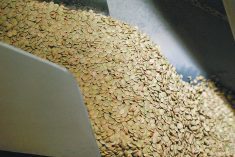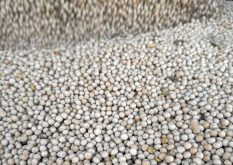Canada must confront EU
Something has to be done about the Europeans.
Their grain subsidies are getting people angry enough to do rash things that could plunge grain markets into a downward spiral.
The Europeans have had the gall to subsidize a barley sale directly to an American buyer. U.S. farm groups are furious and their aggressive lobbying in Washington seems to have paid off with the administration saying it would take “direct action.”
But when the U.S. and EU spar, most of the blows hit innocent farmers in Canada and elsewhere.
Read Also

Moe shares goals for Chinese trade mission
To advocate on behalf of Saskatchewan agriculture and other industries, as well as the Canadian canola, pork, pulse, and seafood industries, Saskatchewan Premier, Scott Moe, is travelling to China on a trade mission.
That is enough to get the Canadian government to protest Europe’s action.
But there is a more direct reason. The EU has subsidized oat sales to the United States for most of the crop year. The Western Producer reported in February that as much as 500,000 tonnes of subsidized oats at subsidies as high as $1.11 a bushel were going to the U.S.
This robbed a natural market from Canada and kept oat prices here below their potential.
This week, United Grain Growers president Ted Allen said the subsidies contributed to the 70-cents-a-bushel drop in oat prices since last fall.
The EU dismissed the barley sale as an anomaly, but it can’t so easily explain the persistent subsidization of oats.
The Canadian government must make strong arguments to the EU to use its agricultural programs more carefully.
Another round of world trade negotiations is about to begin and they shouldn’t be conducted, as they were last time, in the context of an agricultural trade war.
EU agriculture policy needs further alterations to make it more trade friendly. Surely this can be done in negotiations without a trade battle.
Japan eases its grasp
Japan plans to loosen its central control over buying and selling of wheat.
The domestic feed industry says it needs lower feed costs to compete against imported meat.
The government food agency now buys all domestic wheat for high prices and sells it to feed and flour mills at a lower price but still well above international prices.
It imports wheat for international prices and sells it at the higher official domestic prices.
This raises opportunities for the Canadian Wheat Board to sell more feed wheat to Japan. Also, the board usually is able to increase its market share when countries end their central buying agencies.














